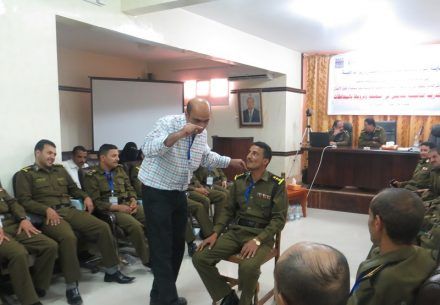International conference in Amman highlights progress of criminal justice reform initiatives in MENA

On 3 and 4 November, PRI’s Middle East and North Africa office co-organised a large international conference with the Office of the High Commissioner for Human Rights and under the patronage of his Majesty King Abdullah II of Jordan.
This conference marked the end of a three year project (2011-2014) funded by the Swedish International Development Cooperation Agency (SIDA) to promote the humane and fair treatment of vulnerable groups in detention in six countries of the Middle East and North Africa (Algeria, Egypt, Jordan, Morocco, Tunisia and Yemen).
The focus of the conference was recent trends in criminal justice reform and human rights, gathering together a wide range of international experts to share their insight and practical experience. The agenda allowed space for the exchange of views on the establishment of effective alternatives to detention, rehabilitation and reintegration programmes and the need to protect the rights of particular groups within the criminal justice system such as women and children. Many practical examples of good practice from the SIDA-funded project were given, together with recommendations for further change.
Despite serious regional challenges, the project has made a real difference for many people in detention, particularly women and children. This has been achieved through practical implementation of international standards, capacity building for professionals within the prison and correctional services, and development of new ways of dealing with offenders.
- A new training centre for prison officers in Yemen. The centre offers two courses on human rights and prison management which are mandatory for officers. The centre is part of the Prison Department and will be funded in future by Yemen’s Ministry of Interior. In an example of the cross-regional cooperation and learning which was a focus throughout the project, staff from Jordan’s prison training department provided support.
- Jordan’s first independent inspection team with a mandate to monitor closed institutions for children and young people. In March 2013, a new independent monitoring team was formally established to monitor Jordan’s social care facilities, including its six juvenile detention centres. PRI played an important role in its creation and development, forming an effective partnership with the Ministry of Social Development, providing training and operational guidance. The new mechanism is in line with international standards: independent, multi-disciplinary, and has guaranteed unrestricted access to facilities within its mandate.
- Two pilot schemes providing post-release support to prisoners were established in Jordan. The first few days and weeks after leaving prison are known to be a critical time in terms of reoffending but Jordan has no official support for reintegration. The results of the pilot demonstrated in particular that support after release is vital – pre-release support only is not sufficient. 40 prisoners took part in the pilots in two prisons, one women’s and one men’s prison. The learning from these pilots is already being applied in Tunisia where a similar pilot is currently being trialled in a women’s prison there.
- Promoting community service as an alternative to prison in Algeria, and the adoption of new reintegration measures. The conference heard how the law was revised with reference to international standards to enable community service to be introduced as a sentencing option.
Further information
Download the conference brochure here
Image: Training at the training centre for prison officers, Yemen, 2013